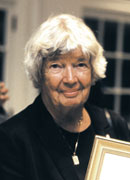June Callwood

Credit: University of Toronto, Faculty of Law
| Giver: | Individual |
|---|---|
| Receiver: | - |
| Gift: | - |
| Approach: | Philanthropy |
| Issues: | 1. No Poverty, 10. Reduced Inequalities, 16. Peace, Justice and Strong Institutions, 3. Good Health and Well-Being, 5. Gender Equality |
| Included in: | Kindness and Generosity |
June Callwood (1924-2007) was a trailblazing Canadian journalist, author and activist who challenged social stigmas and championed the human rights and basic dignity of people at the margins of society. Among the dozens of social action organizations Callwood helped to establish, perhaps her most pioneering accomplishment was the founding of Casey House, Canada’s first stand-alone treatment facility for people with HIV/AIDS, in 1988.
Widely known as “Canada’s conscience,” Callwood was driven by a moral compulsion to confront injustice wherever she saw it, seeing herself not as a heroic individual but rather as an effective catalyst, someone who could rally volunteers, funders and community around a cause. As she told Sandra Martin of the Toronto Globe and Mail, “You have to get a gang,” if you want to realize change. Ultimately Callwood put her faith in the transformative power of basic human kindness to heal all that ails society.
Callwood’s sense of solidarity with socially excluded people was shaped by her childhood experience of parental neglect, material poverty and isolation growing up in Belle River, a French-speaking village in southwest Ontario. Keenly intelligent and independent, she began her career at the age of 18 as a reporter for the Globe and Mail. Soon married with children, she moved into freelance magazine writing and ghostwriting, which she could do mostly from home.
Callwood was drawn to social activism in the 1960s. She became a founding member of the Canadian Civil Liberties Union in 1964 and established Digger House, a volunteer-run hostel for unhoused young people in Toronto’s Yorkville neighborhood, in 1967. Addressing the needs of vulnerable and underserved women, Callwood founded Nellie’s Hostel, a temporary emergency residence for women and children fleeing domestic violence, in 1973, and Jessie’s, a resource center for pregnant teens and young mothers, in 1982.
In the mid-1980s, when HIV/AIDS was still little understood and people with the disease were treated as pariahs – even by medical professionals – Callwood led the campaign to establish Casey House, a hospice facility where terminally ill AIDS patients could receive respectful palliative care and the grace of a dignified death. From its opening in 1988, Casey House offered a model of care that sought to alleviate the isolation and shame so many people with AIDS were experiencing at the height of the epidemic. In Callwood’s words, the purpose of Casey house was to “give compassion a home.”
Among many other awards and accolades, Callwood was named a Companion of the Order of Canada, the country's highest civilian honor, in 2000. Delivering the inaugural lecture of the June Callwood Professorship in Social Justice at the University of Toronto in 2005, she described the guiding principle behind her activism: "I am missing a formal religion,” she said, “but I am not without a theology, and my theology is that kindness is a divinity in motion."
Contributor: Erin Brown
| Source type | Full citation | Link (DOI or URL) |
|---|---|---|
| Website |
“Canadians Hail Callwood’s Legacy.” Canadian Broadcasting Corporation, April 14, 2007. |
https://www.cbc.ca/news/entertainment/canadians-hail-callwood-s-legacy-1.659318 |
| Publication |
Ley, Dorothy C. H. “Caring for Persons with AIDS: Initiatives. The Casey House Model.” Journal of Palliative Care 4, no. 4 (1988): 111-15. |
https://doi.org/10.1177/082585978800400425 |
| Book |
McBurney, Margaret. It’s All About Kindness: Remembering June Callwood. Markham, Ontario: Cormorant Books, 2012. |
9781897151792 |
| Publication |
Martin, Sandra. “Journalist, Activist June Callwood Dies at 82.” Globe and Mail, April 14, 2007. |
https://www.theglobeandmail.com/news/national/journalist-activist-june-callwood-dies-at-82/article1073887/ |